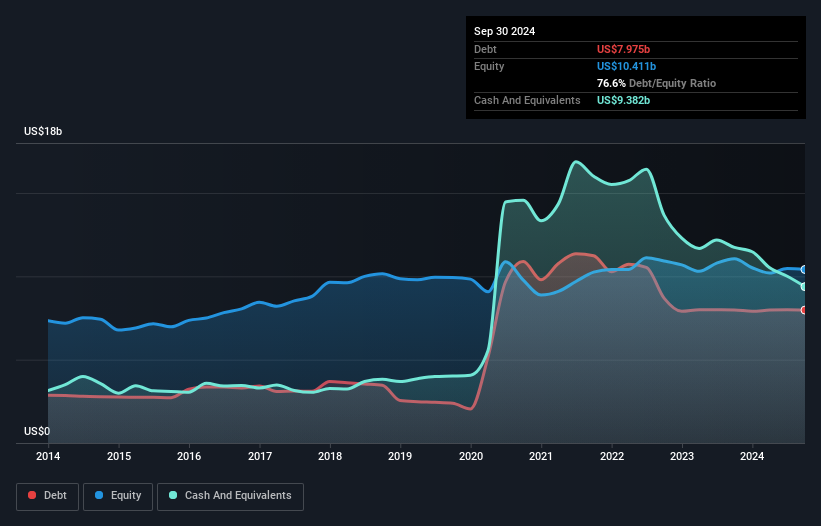- United States
- /
- Airlines
- /
- NYSE:LUV
Here's Why Southwest Airlines (NYSE:LUV) Has A Meaningful Debt Burden

Howard Marks put it nicely when he said that, rather than worrying about share price volatility, 'The possibility of permanent loss is the risk I worry about... and every practical investor I know worries about.' So it might be obvious that you need to consider debt, when you think about how risky any given stock is, because too much debt can sink a company. We note that Southwest Airlines Co. (NYSE:LUV) does have debt on its balance sheet. But is this debt a concern to shareholders?
What Risk Does Debt Bring?
Generally speaking, debt only becomes a real problem when a company can't easily pay it off, either by raising capital or with its own cash flow. If things get really bad, the lenders can take control of the business. However, a more frequent (but still costly) occurrence is where a company must issue shares at bargain-basement prices, permanently diluting shareholders, just to shore up its balance sheet. By replacing dilution, though, debt can be an extremely good tool for businesses that need capital to invest in growth at high rates of return. The first thing to do when considering how much debt a business uses is to look at its cash and debt together.
View our latest analysis for Southwest Airlines
What Is Southwest Airlines's Debt?
The chart below, which you can click on for greater detail, shows that Southwest Airlines had US$7.98b in debt in September 2024; about the same as the year before. But it also has US$9.38b in cash to offset that, meaning it has US$1.41b net cash.

A Look At Southwest Airlines' Liabilities
We can see from the most recent balance sheet that Southwest Airlines had liabilities of US$13.5b falling due within a year, and liabilities of US$10.9b due beyond that. Offsetting this, it had US$9.38b in cash and US$1.18b in receivables that were due within 12 months. So its liabilities outweigh the sum of its cash and (near-term) receivables by US$13.9b.
This deficit is considerable relative to its very significant market capitalization of US$19.4b, so it does suggest shareholders should keep an eye on Southwest Airlines' use of debt. Should its lenders demand that it shore up the balance sheet, shareholders would likely face severe dilution. Despite its noteworthy liabilities, Southwest Airlines boasts net cash, so it's fair to say it does not have a heavy debt load!
But the other side of the story is that Southwest Airlines saw its EBIT decline by 9.3% over the last year. If earnings continue to decline at that rate the company may have increasing difficulty managing its debt load. The balance sheet is clearly the area to focus on when you are analysing debt. But it is future earnings, more than anything, that will determine Southwest Airlines's ability to maintain a healthy balance sheet going forward. So if you're focused on the future you can check out this free report showing analyst profit forecasts.
Finally, while the tax-man may adore accounting profits, lenders only accept cold hard cash. While Southwest Airlines has net cash on its balance sheet, it's still worth taking a look at its ability to convert earnings before interest and tax (EBIT) to free cash flow, to help us understand how quickly it is building (or eroding) that cash balance. During the last three years, Southwest Airlines burned a lot of cash. While that may be a result of expenditure for growth, it does make the debt far more risky.
Summing Up
Although Southwest Airlines's balance sheet isn't particularly strong, due to the total liabilities, it is clearly positive to see that it has net cash of US$1.41b. Despite the cash, we do find Southwest Airlines's conversion of EBIT to free cash flow concerning, so we're not particularly comfortable with the stock. The balance sheet is clearly the area to focus on when you are analysing debt. However, not all investment risk resides within the balance sheet - far from it. These risks can be hard to spot. Every company has them, and we've spotted 1 warning sign for Southwest Airlines you should know about.
Of course, if you're the type of investor who prefers buying stocks without the burden of debt, then don't hesitate to discover our exclusive list of net cash growth stocks, today.
New: Manage All Your Stock Portfolios in One Place
We've created the ultimate portfolio companion for stock investors, and it's free.
• Connect an unlimited number of Portfolios and see your total in one currency
• Be alerted to new Warning Signs or Risks via email or mobile
• Track the Fair Value of your stocks
Have feedback on this article? Concerned about the content? Get in touch with us directly. Alternatively, email editorial-team (at) simplywallst.com.
This article by Simply Wall St is general in nature. We provide commentary based on historical data and analyst forecasts only using an unbiased methodology and our articles are not intended to be financial advice. It does not constitute a recommendation to buy or sell any stock, and does not take account of your objectives, or your financial situation. We aim to bring you long-term focused analysis driven by fundamental data. Note that our analysis may not factor in the latest price-sensitive company announcements or qualitative material. Simply Wall St has no position in any stocks mentioned.
About NYSE:LUV
Southwest Airlines
Operates as a passenger airline company that provides scheduled air transportation services in the United States and near-international markets.
Solid track record with adequate balance sheet.
Similar Companies
Market Insights
Community Narratives



